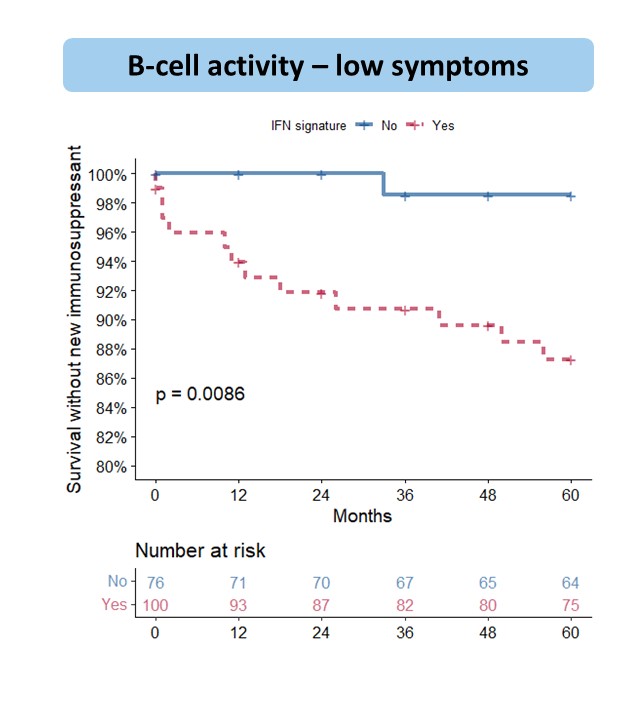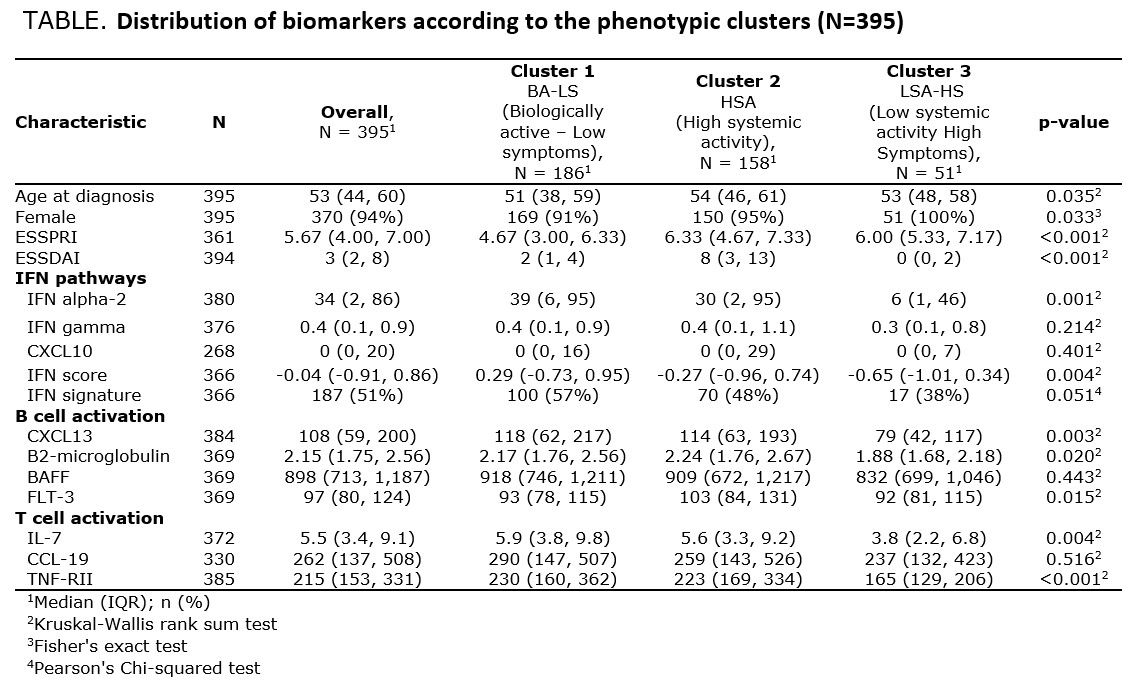Session Information
Session Type: Poster Session C
Session Time: 10:30AM-12:30PM
Background/Purpose: Sjögren’s disease (SjD) is a heterogenous autoimmune disease, with a wide range of symptoms, from dryness, fatigue, pain, to systemic manifestations, and an increased risk of lymphoma. Recently, three clusters of patients with SjD have been described based on unsupervised clustering analysis according to symptoms, clinical signs and biologic parameters: 1/ BALS (B-cell active with low symptoms); 2/ HSA (High systemic activity); 3/ LSAHS (Low systemic activity with high symptoms). We also found that patients from the BALS cluster had higher risk of disease evolution. These findings suggest potential heterogeneity in pathophysiological mechanisms.
To investigate this hypothesis, we examined whether these three clusters were associated with distinct biomarkers. We also aimed to investigate if a high Interferon Signature could predict disease evolution among the different clusters.
Methods: This analysis included 395 patients from the ASSESS cohort (94% female, median age 53 [43-63] years).
A high IFN signature was found in 57%, 48%, and 38% from the BALS, HSA, and LSAHS clusters, respectively (p=0.005). The IFN signature was mainly driven by type I IFN (IFN alpha2 levels of 39 fg/mL in the BALS cluster, 30 fg/mL in the HAS cluster, and 6 fg/mL in the LHASH cluster; p=0.001). Regarding B-cell activation biomarkers, there were differences in the CXCL13 levels (p=0.0032) but not in BAFF levels. Regarding T-cell activation, higher levels of IL7 (p=0.0042) and TNFRII (p< 0.001) were found in the BALS and the HSA clusters compared to the LSAHS group. No differences were found between the BALS and the HSA clusters.
Among patients from the BALS clusters, a high IFN signature was associated with a higher risk of new immunosuppressant treatment (HR 9.38; 95% CI 1.22-72.16; Figure). All lymphoma from the BALS cluster occurred in patients with high IFN signature.
Results: This analysis included 395 patients from the ASSESS cohort (94% female, median age 53 [43-63] years).
A high IFN signature was found in 57%, 48%, and 38% from the BALS, HSA, and LSAHS clusters, respectively (p=0.005). The IFN signature was mainly driven by type I IFN (IFN alpha2 levels of 39 fg/mL in the BALS cluster, 30 fg/mL in the HAS cluster, and 6 fg/mL in the LHASH cluster; p=0.001). Regarding B-cell activation biomarkers, there were differences in the CXCL13 levels (p=0.0032) but not in BAFF levels. Regarding T-cell activation, higher levels of IL7 (p=0.0042) and TNFRII (p< 0.001) were found in the BALS and the HSA clusters compared to the LSAHS group. No differences were found between the BALS and the HSA clusters.
Among patients from the BALS clusters, a high IFN signature was associated with a higher risk of new immunosuppressant treatment (HR 9.38; 95% CI 1.22-72.16; Figure). All lymphoma from the BALS cluster occurred in patients with high IFN signature.
Conclusion: The three phenotypes of SjD, divided by unsupervised clustering analysis, based on symptoms, clinical and biological manifestations, displayed distinct expression of IFN signatures, and markers of T- and B-cell activation, confirming distinct pathophysiological mechanisms. A high IFN signature could predict a systemic evolution in patients the BALS cluster.
To cite this abstract in AMA style:
Nguyen Y, Beydon M, Gottenberg J, MOREL J, Perdringer A, Dernis E, Devauchelle V, Sène D, Dieudé P, couderc M, Fauchais A, Larroche C, Vittecoq O, salliot C, Hachulla E, Le Guern V, Mariette X, Seror R, Nocturne G. Type I Interferon Signature Drives Phenotypic Clusters of Sjögren’s Disease and Can Predict Systemic Evolution Among the “B-cell Active with Low Symptoms” Subgroup [abstract]. Arthritis Rheumatol. 2024; 76 (suppl 9). https://acrabstracts.org/abstract/type-i-interferon-signature-drives-phenotypic-clusters-of-sjogrens-disease-and-can-predict-systemic-evolution-among-the-b-cell-active-with-low-symptoms-subgroup/. Accessed .« Back to ACR Convergence 2024
ACR Meeting Abstracts - https://acrabstracts.org/abstract/type-i-interferon-signature-drives-phenotypic-clusters-of-sjogrens-disease-and-can-predict-systemic-evolution-among-the-b-cell-active-with-low-symptoms-subgroup/


